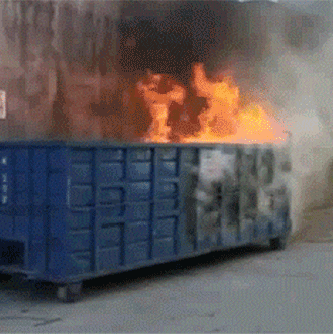It's interesting how strongly people believe one thing is happening and that belief then closes the door on the possibility other things can be happening at the same time. If accusations are happening that may be flimsy or false, that does not preclude there being actual things happening that are not reported or are hard to prove. I don't understand why people have a tough time with this.Do any of you have daughters between the ages of 20-40? Ask them if they have anyone in their circle of friends that has been a victim of SA. Ask them how many went to the police. Develop your own stats. It may surprise you.
Daily Collegian Article On Starrocci Allegations
- Thread starter Misalorales
- Start date
You are using an out of date browser. It may not display this or other websites correctly.
You should upgrade or use an alternative browser.
You should upgrade or use an alternative browser.
I just think that the narrative that the "majority" of SA allegations are BS is a joke. The hot crazy matrix would have 90% of women in the no-go zone.It's interesting how strongly people believe one thing is happening and that belief then closes the door on the possibility other things can be happening at the same time. If accusations are happening that may be flimsy or false, that does not preclude there being actual things happening that are not reported or are hard to prove. I don't understand why people have a tough time with this.
As men "not you @PSUer89 ", try to imagine how jacked you would be to subject yourself to a rape kit exam, scrutiny of your sexual history, what you were drinking, wearing, willingly did or did not do, etc... Yeah, I think the majority of sexual assault allegations are BS. That makes perfect sense. See, sometimes you just need to talk through the issue and it becomes obvious.
I was/am in agreement with your first note. My note was in support of your sentiment. The comments I have seen here are so harshly critical that it leans towards the angry. Yeah, bad people do bad things, but I think it's wild that people are acting like it sullies the work and research showing that this stuff happens and happens a lot.I just think that the narrative that the "majority" of SA allegations are BS is a joke. The hot crazy matrix would have 90% of women in the no-go zone.
As men "not you @PSUer89 ", try to imagine how jacked you would be to subject yourself to a rape kit exam, scrutiny of your sexual history, what you were drinking, wearing, willingly did or did not do, etc... Yeah, I think the majority of sexual assault allegations are BS. That makes perfect sense. See, sometimes you just need to talk through the issue and it becomes obvious.
Experts know more and more about less and less.
Much of the world is ruled by "experts". How's that working out?
/r/im14andthisisdeep/
Anyone who knows current or recent college students should also ask them if they have ever heard SA allegations/rumors about fellow students who were never publicly called out or reported to the police or school. It is very common for people to tell nobody but close friends, and often, the alleged perpetrator does not face any consequences outside of being cut off by certain groups of people who hear the allegations.Do any of you have daughters between the ages of 20-40? Ask them if they have anyone in their circle of friends that has been a victim of SA. Ask them how many went to the police. Develop your own stats. It may surprise you.
To 82's point, many girls will not want to go through the ordeal of officially reporting and will only tell their friends. I think many would be surprised by the results of a poll such as his. Further, I would bet that most male college students have heard SA allegations about guys at their schools that weren't legal or even school disciplinary cases, just word of mouth from people telling/warning those close to them.
And many people are falsely accused. Depending on what you term as sexual assault, you might be considered an assault. The we have the cases where someone decides days later they were assaulted. How does someone defend themselves against that or what they believed was consensual? Why can a woman not be able to consent while drunk but a man is held to a sober standard?Anyone who knows current or recent college students should also ask them if they have ever heard SA allegations/rumors about fellow students who were never publicly called out or reported to the police or school. It is very common for people to tell nobody but close friends, and often, the alleged perpetrator does not face any consequences outside of being cut off by certain groups of people who hear the allegations.
To 82's point, many girls will not want to go through the ordeal of officially reporting and will only tell their friends. I think many would be surprised by the results of a poll such as his. Further, I would bet that most male college students have heard SA allegations about guys at their schools that weren't legal or even school disciplinary cases, just word of mouth from people telling/warning those close to them.
Try having a false accusation levied against you and see how you think about the subject.
Anyone who knows current or recent college students should also ask them if they have ever heard SA allegations/rumors about fellow students who were never publicly called out or reported to the police or school. It is very common for people to tell nobody but close friends, and often, the alleged perpetrator does not face any consequences outside of being cut off by certain groups of people who hear the allegations.
To 82's point, many girls will not want to go through the ordeal of officially reporting and will only tell their friends. I think many would be surprised by the results of a poll such as his. Further, I would bet that most male college students have heard SA allegations about guys at their schools that weren't legal or even school disciplinary cases, just word of mouth from people telling/warning those close to them.

Title IX False Accusations | Wrongly Accused | Nesenoff & Miltenberg, LLP
Empower yourself with knowledge on universities' unique investigation processes for sexual harassment. Get expert guidance from our law firm.
This is what young men have faced on campus, from the article:
Because Title IX proceedings do not fall under the purview of the state or federal criminal courts, universities are not required to comply with the federal rules of evidence. Instead, educational institutions are only required to abide by general guidelines. For this reason, evidence that would normally be kept out of court, such as hearsay or rumors, could be used against someone accused of harassment or assault during a university review. This does not mean that an investigator will automatically assume the truth of any statements provided by the parties themselves or any witnesses asked to testify. Instead, the university will be tasked with using its own judgment to determine whether a witness’s statements are true or false.
Can a Witness in Title IX Investigation be Charged with Perjury for Lying?
As stated previously, universities are not required to abide by any specific rules of evidence when investigating allegations of sexual harassment or sexual violence. Unfortunately, this means that a person who lies or provides false information during an investigation does not face the same penalties that he or she would as a witness in criminal court. For example, a student who lies during an investigation cannot be found guilty of perjury unless the case officially goes to court and the student lies in court. A person could be brought up on charges, however, of lying to police officers or impeding a criminal investigation if the accusations are accompanied by an official criminal complaint.
It is also true, however, that most universities have their own policies when it comes to dishonesty. For instance, some educational institutions can take disciplinary measures against witnesses who provide false information or testimony during an investigation. These penalties vary depending on the school code of conduct in question, but could include suspension or even expulsion. In many cases, facing these penalties is enough to deter a student from lying during an investigation into harassment or assault.
Can I be Found Responsible Even if There is No Solid Proof?
Universities are required to use a certain standard of proof when investigating allegations of sexual harassment. Under the current regulations an institution could decide to use a clear and convincing standard, which requires complainants to prove the accused’s fault with clear and convincing evidence. But most universities use the much less strict preponderance of the evidence standard, which only demands that the accuser prove that it is more likely than not that the accused is guilty of the offense. Under this standard, if an investigator believes the complainant over the accused when there are no other witnesses, this is sufficient to meet the preponderance standard and find the accused guilty.
Which of these standards is used by a university can have a significant impact on whether or not a person is found guilty of sexual harassment. Although recently proposed regulations would amend Title IX to require colleges to apply greater protections for the accused student [not accurate I believe it is both preponderance and clear and convincing], whether these regulations will be finalized still remains to be seen.
While this is not criminal expulsion from school and failure to obtain your degree causes the falsely accused real harm. How do you pay your student loans back? Try explaining the expulsion when you're applying to other schools.
What, are you an expert or something?Experience matters.
Experts built the wonderful iPhone that I’m using. So experts are working out for smart phones. Experts designed the US building codes, and so when we get earthquakes, we get small death tolls whereas countries that don’t have experts get death tolls in the tens of thousands. So experts are working out for structural safety. Experts predict hurricanes, and, again, US death tolls are much smaller than in countries without experts. Cael Sanderson is an expert in wrestling and coaching. I can go on and on.
On the other side, the Chinese communists declared war on experts in their first few decades and tens of millions starved to death as a direct result, and the country remained poor and backward. I would not advise anybody to follow that example and start firing experts en masse!
So, any blanket assertion that experts are categorically bad has been disproven here, and a painfully wrong assertion has not gone unopposed. But this is a wrestling forum, so we should probably not add any more philosophy musings and ratiocination about experts.
Actually, experts designed your iPhone. Foxconn and its questionable labor practices built it.
Most everything you cited is technical experts staying in their narrow lane. There are no expert
Civil engineers who design building codes are no more qualified to opine on civil society than the guy hanging off the Waste Management Truck.
Experts don't predict hurricanes; they can't even predict their paths with any decent degree of certainty.
The Chinese who "declared war" on experts-considered themselves the real experts-fit to make the Chinese society in their image.
An even when "experts" are opining in their sphere of expertise, they can confuse its boundaries and make errors. For several decades we've been told that sun exposure was bad for us and we risked cancer from excess exposure. Now we know that there is a myriad of cancers associated with inadequate exposure, as well as other diseases associated with low Vitamin D. I remember when experts told us chocolate was bad for us-until other people discovered cocoa polyphenols.
You seem awfully sensitive about this-you must fancy yourself as an expert. It would explain how much you know about so little. Now put on your mask.
Isn't that what we used to call hubris?He red flagged it but was overruled by the younger "experts". The testing of the new propulsion did not go good.. The younger "experts" sent him a letter accepting what he was telling them.
Social media tends to make us all able to research thoughts and have opinion.
However you only become an expert if you stay at a Holiday Inn.
Godwin’s law requires us to start talking about Nazis or Hitler, soon. I can feel it coming.
Whether or not an incident is reported to the police or an institution might also depend on the immediate relationships within the sphere of the person who claims they were assaulted. One tried and true method that can be used rather than reporting to the authorities is the thorough *** beating approach, usually administered by big boyfriends or husbands. Not recommended for use against a guy like Carter, however.And many people are falsely accused. Depending on what you term as sexual assault, you might be considered an assault. The we have the cases where someone decides days later they were assaulted. How does someone defend themselves against that or what they believed was consensual? Why can a woman not be able to consent while drunk but a man is held to a sober standard?
Try having a false accusation levied against you and see how you think about the subject.
Can we start a new thread if there is ever anything new on the original topic?
Taking one’s own personal experience and generalizing across the everyone’s experience is pretty narrow minded. I work with SA survivors and can tell you that they are not making accusations for fun. Even in this case, not a single woman has come forward that they were assaulted. The accusations are coming from a third partyYour links are ********. I’m talking to actual officers who deal with this stuff.
there is no way to tell if the majority of complaints are true. From talking to authors, who investigate these crimes, the majority are false and done as a form of retribution or just to cause someone a problem. It’s the easiest thing to do when the officer starting an investigation, it quickly goes nowhere the case gets dropped
I literally had it happen to myself. My wife had a false report filed against her when she was a young mother. I’ve talked to many other police officers they start looking into it. They find out it’s nonsense and then the investigation goes nowhere.
If there is credible information goes forward.
however, for many years, these kind of accusations could really hurt and have her young man in college campuses. In many cases with the student tribunal, they were not allowed legal representation and while you might not have a criminal charge against you, you could be tossed out out of school and have that on your record. They were literally trying people without representation.
Godwin’s law requires us to start talking about Nazis or Hitler, soon. I can feel it coming.

Ray Lewis, OJ, Big Ben, Austin Scott, Duke LacrosseOff the top of my head, the current punter for the KC Chiefs when he played at San Diego State.
Are we supposed to separate the guilty from the innocent in this list?Ray Lewis, OJ, Big Ben, Austin Scott, Duke Lacrosse
Wow. So far we have one story written by a kid in a college newspaper, which has not been picked up by a single solitary second publication of any kind. The kid did zero fact checking and has zero credible sources that can be verified. 19 pages of this rabbit hole, meanwhile, and cryptic posts about "not afraid of discovery" which is also fascinating since there have been zero charges and zero confirmations for any investigation.
Can we please jump to November already and start wrestling again?
Can we please jump to November already and start wrestling again?
Can we start a new thread if there is ever anything new on the original topic?
Nope. You have to do this with the rest of us...

Taking one’s own personal experience and generalizing across the everyone’s experience is pretty narrow minded. I work with SA survivors and can tell you that they are not making accusations for fun. Even in this case, not a single woman has come forward that they were assaulted. The accusations are coming from a third party
"I work with SA survivors nd can tell you that they are not making accusations for fun."
"Taking one’s own personal experience and generalizing across the everyone’s experience is pretty narrow minded."
Reversing the order does accentuate the irony, doesn't it??
Amusement has never been thought to be motive here, why offer that as a basis of dispute.
It doesn't matter if every claim ever made but one it factual, if this is the false one. Aggregate statistics say nothing about the individual item, they aren't fungible.
Here's the one thing NOBODY I've seen has explored. The DC article said that ""Mutual connections eventually brought her story to the Bartletts."
So, what we are supposed to believe is that Syd Bartlett becomes aware of criminal activity, she doesn't go to the police or an attorney, instead she tells Starocci's girlfriend (who apparently didn't experience anything like this) and some cub reporter?
What exactly did the cub reporter or the DC do to verify not only the nature of the claim and the identity of the claimant? If they simply said thanks for the name-we'll give them a call, EPIC FAIL on adequate verification.
BTW, no matter what state of mind or maturity of the alleged victim at the time of the alleged crime, she presumably is more mature and has had the opportunity to seek guidance then.
The Statute of Limitations in Pennsylvania on Rape is 12 (Twelve) years. If he did something, bring charges.
Section 5552.0 - Title 42 - JUDICIARY AND JUDICIAL PROCEDURE
Jump to November? That's when the panic and hand ringing really amps up!Wow. So far we have one story written by a kid in a college newspaper, which has not been picked up by a single solitary second publication of any kind. The kid did zero fact checking and has zero credible sources that can be verified. 19 pages of this rabbit hole, meanwhile, and cryptic posts about "not afraid of discovery" which is also fascinating since there have been zero charges and zero confirmations for any investigation.
Can we please jump to November already and start wrestling again?
Here is a problem with this, you could not get a group of people to agree on the definition of sexual assault. Sexual assault could probably range from unwanted touching all the way to penetration rape. Yes, there are plenty of sexual assaults that go unreported. Yes, there are sexual assault charges/accusations that are complete fabrication. Yes, there are plenty that are in between. We will never know what the true numbers are because surveys for something like this are unreliable.Do any of you have daughters between the ages of 20-40? Ask them if they have anyone in their circle of friends that has been a victim of SA. Ask them how many went to the police. Develop your own stats. It may surprise you.
True but many accusations are false too. Maybe you're being narrow minded as well. It goes both ways.Taking one’s own personal experience and generalizing across the everyone’s experience is pretty narrow minded. I work with SA survivors and can tell you that they are not making accusations for fun. Even in this case, not a single woman has come forward that they were assaulted. The accusations are coming from a third party
What are ya, the Gestapo??Godwin’s law requires us to start talking about Nazis or Hitler, soon. I can feel it coming.
Jawohl, Mein Fuhrer!Godwin’s law requires us to start talking about Nazis or Hitler, soon. I can feel it coming.
Dang, no one told me ON3 was gonna be this lame. Rivals got bought out by the Cesspool?
Last edited:
For the sake of clarity, when I was referring to sexual assault in the referenced post I did not mean the following:Here is a problem with this, you could not get a group of people to agree on the definition of sexual assault. Sexual assault could probably range from unwanted touching all the way to penetration rape. Yes, there are plenty of sexual assaults that go unreported. Yes, there are sexual assault charges/accusations that are complete fabrication. Yes, there are plenty that are in between. We will never know what the true numbers are because surveys for something like this are unreliable.
1. unwanted touching, groping, or rubbing up against someone at a party, bar, or in a more private setting.
2. Unwanted sexual/lewd comments.
I did mean all the other acts that most of us would 100% agree on (shocking!) as rape.
For the sake of clarity, when I was referring to sexual assault in the referenced post I did not mean the following:
1. unwanted touching, groping, or rubbing up against someone at a party, bar, or in a more private setting.
2. Unwanted sexual/lewd comments.
I did mean all the other acts that most of us would 100% agree on (shocking!) as rape.
That's Syd's theory of what happened. She doesn't know for certain whether if it's true or not.
A theory could be that she was involved in the locker room theft, to pit Beau against his teammates. Again, we don't know if that's true or not either.
The law defines rape. Having sex with someone unable to consent (whether it’s cognitive ability, alcohol impairment, being unconscious) is rape. If one wants to avoid sexual assault accusations, the first step is to know what constitutes SA/rape.And many people are falsely accused. Depending on what you term as sexual assault, you might be considered an assault. The we have the cases where someone decides days later they were assaulted. How does someone defend themselves against that or what they believed was consensual? Why can a woman not be able to consent while drunk but a man is held to a sober standard?
Try having a false accusation levied against you and see how you think about the subject.
Ones being a perv and the other is being a molester. This is getting old.The law defines rape. Having sex with someone unable to consent (whether it’s cognitive ability, alcohol impairment, being unconscious) is rape. If one wants to avoid sexual assault accusations, the first step is to know what constitutes SA/rape.
Everything is wrapping up. Starocci will be back as NLWC athlete.
For your sakes (PSU as an institution) - I hope this in-house investigation isn't just another coverup attempt. That never works, and the truth always comes out eventually. But as of now, sounds like Carter, the coaching staff, etc will be given the all clear pretty soon.
For your sakes (PSU as an institution) - I hope this in-house investigation isn't just another coverup attempt. That never works, and the truth always comes out eventually. But as of now, sounds like Carter, the coaching staff, etc will be given the all clear pretty soon.
There was no apparent verification that Starocci's girlfriend was notified by Syd. In fact, the entire story is largely unverified. See post #122 in this thread on page four for my long take.So, what we are supposed to believe is that Syd Bartlett becomes aware of criminal activity, she doesn't go to the police or an attorney, instead she allegedly tells Starocci's girlfriend (who apparently didn't experience anything like this) and some cub reporter?
Oh my God, one big fabrication just to attack a coaching staff. Say it ain't so.
The Collegian looks worse and worser as the days go by.
The Collegian looks worse and worser as the days go by.
Oh my God, one big fabrication just to attack a coaching staff. Say it ain't so.
The Collegian looks worse and worser as the days go by.
It‘s Cael’s fault for winning too much. Blend in and no one cares.



